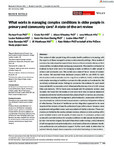What works in managing complex conditions in older people in primary and community care? A state‐of‐the‐art review
| dc.contributor.author | Frost, R | |
| dc.contributor.author | Rait, G | |
| dc.contributor.author | Wheatley, A | |
| dc.contributor.author | Wilcock, J | |
| dc.contributor.author | Robinson, L | |
| dc.contributor.author | Harrison Dening, K | |
| dc.contributor.author | Allan, L | |
| dc.contributor.author | Banerjee, Sube | |
| dc.contributor.author | Manthorpe, J | |
| dc.contributor.author | Walters, K | |
| dc.date.accessioned | 2021-10-08T10:44:46Z | |
| dc.date.issued | 2020-11 | |
| dc.identifier.issn | 0966-0410 | |
| dc.identifier.issn | 1365-2524 | |
| dc.identifier.uri | http://hdl.handle.net/10026.1/18002 | |
| dc.description.abstract |
The number of older people living with complex health conditions is increasing, with the majority of these managed in primary and community settings. Many models of care have been developed to support them, however, there is mixed evidence on their value and they include multiple overlapping components. We aimed to synthesise the evidence to learn what works for managing complex conditions in older people in primary and community care. We carried out a state-of-the-art review of systematic reviews. We searched three databases (January 2009 to July 2019) for models of primary and community care for long-term conditions, frailty, multimorbidity and complex neurological conditions common to older people such as dementia. We narratively synthesised review findings to summarise the evidence for each model type and identify components which influenced effectiveness. Out of 2,129 unique titles and abstracts, 178 full texts were reviewed and 54 systematic reviews were included. We found that the models of care were more likely to improve depressive symptoms and mental health outcomes than physical health or service use outcomes. Interventions including self-management, patient education, assessment with follow-up care procedures, and structured care processes or pathways had greater evidence of effectiveness. The level of healthcare service integration appeared to be more important than inclusion of specific professional types within a team. However, more experienced and qualified nurses were associated with better outcomes. These conclusions are limited by the overlap between reviews, reliance on vote counting within some included reviews and the quality of study reports. In conclusion, primary and community care interventions for complex conditions in older people should include: (a) clear intervention targets; (b) explicit theoretical underpinnings; and (c) elements of self-management and patient education, structured collaboration between healthcare professionals and professional support. Further work needs to determine the optimal intensity, length, team composition and role of technology in interventions. | |
| dc.format.extent | 1915-1927 | |
| dc.format.medium | Print-Electronic | |
| dc.language | en | |
| dc.language.iso | en | |
| dc.publisher | Wiley | |
| dc.subject | ageing | |
| dc.subject | chronic disease management | |
| dc.subject | chronic | |
| dc.subject | long-term conditions | |
| dc.subject | community care | |
| dc.subject | primary care | |
| dc.title | What works in managing complex conditions in older people in primary and community care? A state‐of‐the‐art review | |
| dc.type | journal-article | |
| dc.type | Journal Article | |
| dc.type | Research Support, Non-U.S. Gov't | |
| dc.type | Review | |
| plymouth.author-url | https://www.webofscience.com/api/gateway?GWVersion=2&SrcApp=PARTNER_APP&SrcAuth=LinksAMR&KeyUT=WOS:000548438100001&DestLinkType=FullRecord&DestApp=ALL_WOS&UsrCustomerID=11bb513d99f797142bcfeffcc58ea008 | |
| plymouth.issue | 6 | |
| plymouth.volume | 28 | |
| plymouth.publication-status | Published | |
| plymouth.journal | Health and Social Care in the Community | |
| dc.identifier.doi | 10.1111/hsc.13085 | |
| plymouth.organisational-group | /Plymouth | |
| plymouth.organisational-group | /Plymouth/Faculty of Health | |
| plymouth.organisational-group | /Plymouth/Faculty of Health/Peninsula Medical School | |
| plymouth.organisational-group | /Plymouth/Faculty of Health/Peninsula Medical School/PMS - Manual | |
| plymouth.organisational-group | /Plymouth/REF 2021 Researchers by UoA | |
| plymouth.organisational-group | /Plymouth/REF 2021 Researchers by UoA/UoA03 Allied Health Professions, Dentistry, Nursing and Pharmacy | |
| plymouth.organisational-group | /Plymouth/Users by role | |
| plymouth.organisational-group | /Plymouth/Users by role/Academics | |
| plymouth.organisational-group | /Plymouth/Users by role/Researchers in ResearchFish submission | |
| dc.publisher.place | England | |
| dcterms.dateAccepted | 2020-06-16 | |
| dc.rights.embargodate | 2021-10-9 | |
| dc.identifier.eissn | 1365-2524 | |
| dc.rights.embargoperiod | Not known | |
| rioxxterms.versionofrecord | 10.1111/hsc.13085 | |
| rioxxterms.licenseref.uri | http://www.rioxx.net/licenses/all-rights-reserved | |
| rioxxterms.licenseref.startdate | 2020-11 | |
| rioxxterms.type | Journal Article/Review |


